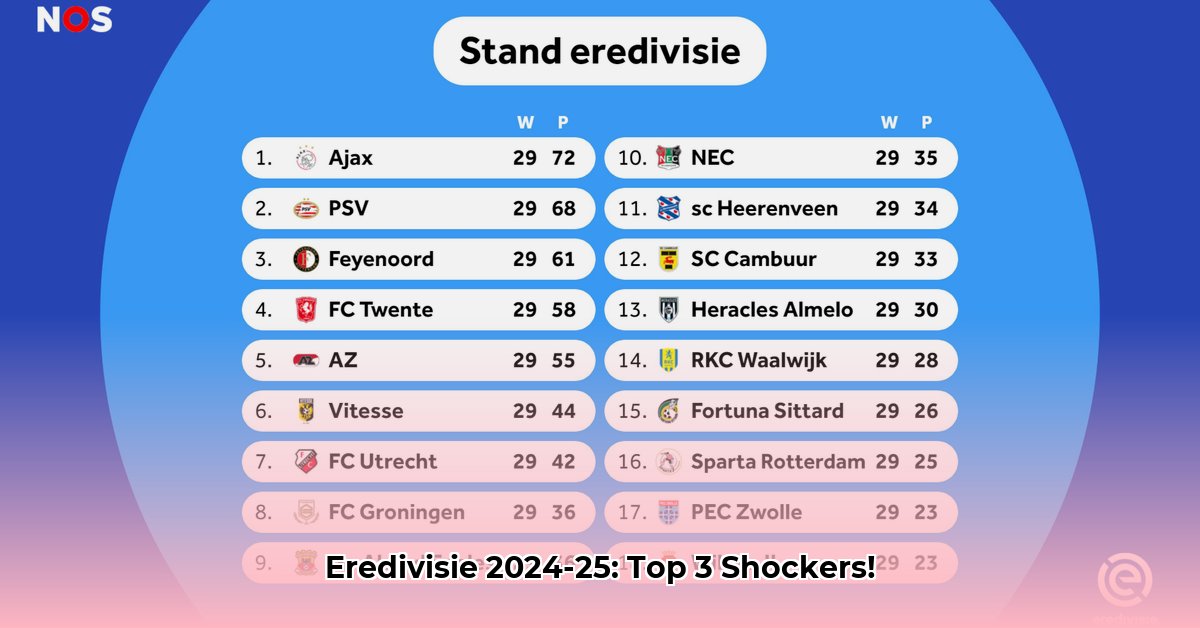
The Usual Suspects, But a Different Story
The 2024-25 Eredivisie season concluded with the familiar sight of Ajax, PSV Eindhoven, and Feyenoord battling for top honours. But this year’s race wasn't simply a replay of past glories; it was a compelling narrative woven with unexpected plot twists, financial anxieties, and the persistent shadow of the pandemic's lingering effects. This deep dive explores the season's highlights, the challenges facing the league, and the future of Dutch football.
Ajax, PSV, and Feyenoord: A Tale of Three Cities
Ajax, fuelled by its renowned youth academy, again showcased dazzling attacking football, a relentless engine of goals and thrilling play. However, their defence proved a source of vulnerability, leading to inconsistent results. Their rollercoaster season reflected a potent attack but a leaky backline, leaving them susceptible to upsets. This inconsistency, despite their attacking brilliance, raises questions about their long-term title aspirations. Wasn't their defensive fragility a major factor in their failure to secure the title convincingly?
PSV Eindhoven, in contrast, adopted a more pragmatic approach, focusing on midfield control and clinical finishing. Their style, while perhaps less aesthetically pleasing, proved remarkably effective. Their consistency, a hallmark of their campaign, underscored the value of a well-defined tactical plan and a team playing with focus and discipline. Their title challenge was built on a foundation of solidity and efficiency. Isn't this a testament to effective coaching and team cohesion?
Feyenoord's campaign was a dramatic rollercoaster. Their thrilling blend of flair and grit yielded both breathtaking wins and frustrating defeats in equal measure. Their unpredictability was undeniably captivating, but this volatility, while exciting for fans, ultimately proved detrimental to their title hopes. Did their inconsistency ultimately cost them a genuine shot at the championship?
Beyond the Big Three: A League of Contenders
While Ajax, PSV, and Feyenoord dominated the headlines, this season showcased the Eredivisie's surprising depth. FC Utrecht's consistent push for European qualification provided a compelling subplot, illustrating the league’s growing competitiveness. Teams like AZ Alkmaar and FC Twente also flashed brilliance, demonstrating their ability to challenge the established giants. This level of competition, extending beyond the traditional top three, adds significant intrigue to the Dutch football landscape. Isn't this increased competitiveness a positive sign for the future of the Eredivisie?
Relegation Battle: A Nail-Biter
The relegation battle was a separate drama entirely, a heart-stopping struggle for survival. With points separating teams by razor-thin margins, the intensity was palpable. This narrative showcased the unpredictable nature of the league, reminding us that even established clubs aren't immune from the possibility of relegation. The nail-biting tension, extending to the final weeks, provided compelling viewing for those at the edge of their seats. Doesn't this dramatic struggle show the true meaning of competitiveness across the entire league?
Financial Disparities: A Looming Shadow
The Eredivisie faces a growing concern; the widening financial gulf between the top three and the rest. Ajax's considerable revenue advantage overshadows the financial struggles of many other clubs. This disparity undermines fair competition and raises concerns about the long-term health of the league. Professor Johan de Jong, Economics, Erasmus University Rotterdam, highlights the need for "a more equitable revenue-sharing model to ensure the sustainability of smaller clubs." This financial imbalance poses a serious challenge to the league's future. How can the KNVB effectively address this increasingly worrisome financial inequality?
The Pandemic's Enduring Impact
The COVID-19 pandemic’s effects persist, serving as a harsh lesson on the unpredictable nature of external factors impacting the footballing world. While the immediate crisis has passed, its long-term financial ramifications continue to shape the Eredivisie's landscape, underscoring the fragility inherent in the professional football ecosystem. The pandemic's impact acts as a stark reminder of the importance of proactive financial planning and resilience for all teams. Does this necessitate a greater focus on long-term financial stability for all Eredivisie clubs?
The Future of the Eredivisie: Navigating Challenges
The Eredivisie's future depends on addressing these challenges. Maintaining a level playing field, attracting new investors, developing young talent, and fostering competitive balance are all critical for its continued success. However, with a passionate fanbase, emerging talent, and the potential for increased broadcast revenue, the league retains significant potential. The challenges ahead are significant, but the rewards of overcoming them could be immense. What innovative strategies can ensure the Eredivisie's ongoing competitiveness and appeal?
Eredivisie Top 3 Performance Summary (2024-25 Season)
| Team | Strengths | Weaknesses | Overall Performance |
|---|---|---|---|
| Ajax | Explosive attack, youth academy production | Defensive inconsistency, vulnerability | Strong overall, but inconsistent results |
| PSV | Tactical solidity, strong midfield, clinical finishing | Limited attacking variety in some matches | Consistently strong, title contenders |
| Feyenoord | Flair and grit, unpredictable style | Inconsistency, lack of defensive stability | Exciting, but erratic performances |
This analysis is preliminary and based on currently available data. Further research may refine these observations. The Eredivisie remains a dynamic league, its future subject to constant change.